Category Archive 'Yale University'
08 Feb 2016


I logged into the Oldest College Daily web-site the other day, in the course of looking for blog fodder editorials or news items. I didn’t find anything of interest in either category, but I could not avoid noticing how different today’s Yale Daily News is from the paper in my day. Obviously, there’s been a lot of technological change. I can remember night-editing and pasting up the entire paper piece by piece out of bits of paper to be printed before dawn on an enormous press down in the News building’s basement. I expect that it’s a bit easier to do all that on a PC today.
The paper’s online edition has one of those floating advertising blocks, sitting just below the paper’s logo. The advertising changes with every new mouse click or page selection. But I happened to hit the ambulance-chasing legal advertisement you see above.
Now that’s change for you! In my day, we would have had an ad for the now-extinct Quality Wine or for J. Press. Today, the politics of resentment have created such a witch-hunting atmosphere at places like Yale that enterprising law firms recognize the existence of large potential client base in the male undergraduate community.
If Peter Salovey had any common sense, when he looked at the Yalie Daily and saw that ad, he would say to himself: “By heaven, when they are running ads like this, things have obviously gone outrageously too far, and something has to be done! Tomorrow morning I’m closing down the Womens’ (Cultural Identity) Center permanently, and I’m going to assemble a blue-ribbon committee of responsible faculty, students, and alumni to write another Woodward Report, this time affirming Yale student and faculty due process rights and rejecting federal interference and identifying inflammatory paranoia-inducing leftist agitation and propagandizing as dangerous to the comity of the university and the rights of the members of its community.
“Hereafter, we are going to start treating Yale students as individuals and adults, not as members of groups of victims entitled to special privileges and compensations and not as members of a historically-oppressive majority burdened with special intrinsic demerits and inherited guilt. If someone believes she has been a victim of sexual assault, if she is right, a crime has been committed and it is a matter for the police. The university administration has no business attempting to set up extra-judicial procedures to dispense justice. That is what the police and court system is for.”
30 Dec 2015
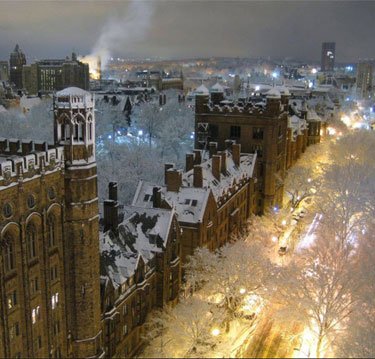
The College Street edge of the Yale Old Campus (where freshmen reside), with Sterling Library and the Payne-Whitney Gymnasium in the left background and Klein Biology Tower in the distance on the right. I can see the window of my freshman year bedroom on the ground floor of Welch Hall (just this side of Phelps Gate) quite clearly.
30 Nov 2015

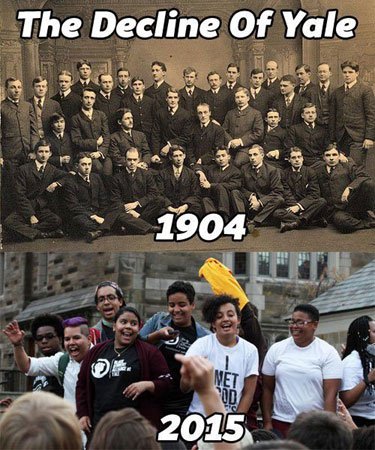
“Stringer Bell”, a student currently at Yale, comments on the Social Justice Revolution underway at Yale.
These events have allowed people’s true motivations and opinions to be revealed. What some students are realizing is that their very existence is perceived as a threat. The encroaching ideology holds that by existing in the world as a white person, white people are unaware of the privileged status they hold. Anything short of continually reminding themselves that they are white, they are oppressors, and any interactions they have with a people of color have power struggle implications, is pure racism.
People are no longer individuals; we are representatives of our respective pasts. A white male speaking with a black female is not merely one human being interacting with another—no, it is one representative of the oppressor class speaking with another representative from the oppressed class.
White students, and to a lesser extent Asian students, are targets. I’ve listened to white students describe their feelings of shock and betrayal at having been accused of racism for the sin of existing. While they will readily agree that racism is a problem, many look utterly bewildered when you tell them that they are supporting “systemic racism†because they don’t take the time to incorporate the experiences of every minority group into their perspective at all times. The protesters have overplayed their hand.
It’s not all about race, ethnicity, or gender, however—ideology trumps all. Generally, white students who parrot the right opinions have been able to move through Yale with fewer accusations of racism than students of color who remain neutral or question the “Next Yale†movement. An undercurrent of resentment is forming among the dissenters of all backgrounds.
Keep in mind that the people at Yale are as liberal as they come. This grand university may soon no longer be worth saving. At this point many students are focusing on getting their degrees and getting the fuck out of here.
04 Nov 2015

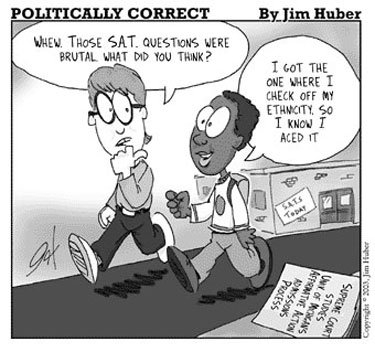
Yale News:
Yale will devote $50 million in resources over the next five years to enhance the excellence of its faculty by building diversity university-wide, President Peter Salovey and Provost Ben Polak announced in a Nov. 3 email.
“Yale’s education and research missions are propelled forward by a faculty that stands at the forefront of scholarship, research, practice, mentoring, and teaching. An excellent faculty in all of these dimensions is a diverse faculty, and that diversity must reach across the whole of Yale — to every school and to every department,†wrote the President and Provost.
‘This commitment has been and continues to be one of the university’s most important,†they continued. “Over the past three decades several Yale initiatives helped to foster a more diverse and more inclusive faculty, and all of our schools have worked diligently in recent years to contribute toward this goal. We are grateful for this collective effort, and for the resources that have already been invested. But we can and should do more.â€
Whole thing.
Diversity is right up there with Recycling and Climate Change at the top of the hierarchy of ideas which succeed in infatuating the supposedly well-educated elites despite their obvious puerile absurdity.
“Diversity” to Yale simply means hiring more questionably qualified blacks, women, and queers specifically to teach in bogus, intellectually fraudulent fields recently invented to flatter group egos, sow group divisions, and fan the fires of group grievances.
Tuition and room and board at Yale these days (Lord!) costs $63,250 per annum. For roughly $25 million Yale could give 100 full four-year scholarships to 100 veterans of military service. The kind of Americans who serve in the military would be a lot more meaningfully “diverse” in social background, life experience, and philosophic outlook than a bunch narcissistic purveyors of cultural studies and their presence a lot more enriching.
If Yale wanted real diversity, the administration would start hiring a few conservative and Republican faculty and administrators and would give undergraduate organizations and social groups on the Right access to meeting places instead of actively persecuting them and trying to drive them out of existence.
13 Oct 2015

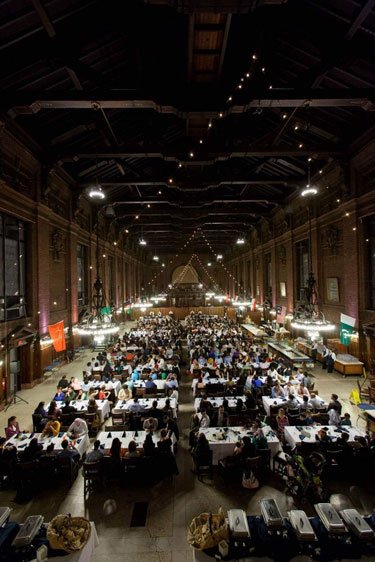
Yale University, founded in 1701 as a collegiate school to prepare young men for the Congregational ministry in Connecticut, I learned today, has been holding lavish Eid (the feast held at the end of a month of fasting by the followers of Mahound) Banquets for the past fourteen years.
This Buzzfeed article, written relying on slang and cultural references post-pubescents are unlikely to understand, particularly singled out female Saracens for praise, alleging that a group of young women of differing races and nationalities who posed for photographs in various traditional ethnic get-ups were “flawless,” “taking charge,” and expressing simultaneously religious convictions and a slang obscenity addressed to people questioning a supposed right to combine a Yale education with affiliation with a sect theologically committed to the forcible conversion or extermination of Congregationalists.
An African young lady named Emi Mahmoud was lauded as “the Number One Poet in the World” having been declared “champion” of the “2015 World Poetry Slam.” I looked it up and discovered that this event, held in Albuquerque, involved 72 of the “best women poets in slam” competing over two nights for a championship. Despite the presence of lots of FAQs, I was completely unable to determine what a slam is.
Bien pensant institutions like Yale absolutely preen over the diversity of it all, having representatives of all sorts of tribes and cultures on campus, studying away for credentials which operate as pass keys into the upper reaches of haute bourgeois Western consumerist society. The presence of all these exotic specimens at Yale simultaneously demonstrates the global reach of Mother Yale, the truly magnificent tolerance and condescension of her administrative authorities, and the inevitable universal triumph of their values and the system they so comfortably preside over.
Personally, I think the ten Congregationalist ministers who met in Saybrook and pooled their books to found that collegiate school in 1701 are spinning in their graves.
23 Sep 2015
The Pundits are among the suspects.

Formerly Berkeley College

Formerly Yale School of Forestry & Environmental Studies

Formerly Davies Auditorium
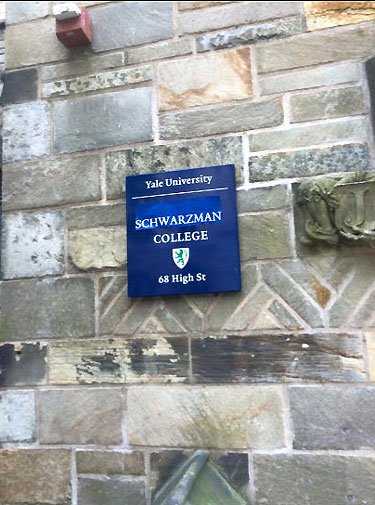
Formerly Jonathan Edwards College
18 Sep 2015


Lekdijk Bovendams, Beinecke Library, Yale University.
Yale University acquired a 17th century Dutch bond as an acquisition for its rare book & manuscript collection, but that is not stopping Yale from collecting the interest due on the perpetual bond.
Bloomberg Business:
Yale University will receive 136.20 euros ($153) in interest on a perpetual bond issued in 1648 from Dutch water authority de Stichtse Rijnlanden.
The 1,000 guilder-bond ($509), which is written on goatskin, is among five of the world’s oldest bonds that still pay interest, according to Clarion Wegerif, a spokeswoman for the water authority. The money will be paid out on Monday.
Yale contacted the agency to collect the interest, Wegerif said in a phone interview from Houten, the Netherlands. “We’ll be handing out a symbolic check and wire the rest.”
Yale, which has an endowment of $23.9 billion, paid 24,000 euros to acquire the bond in 2003 as an artifact. The university hasn’t been paid interest since the acquisition, according to the agency. The bond was issued to pay for a small pier in the Netherlands’s Lek river.
12 Sep 2015

The Society of Orpheus and Bacchus (generally referred to as “The SOBs”), founded 1938, is the second oldest of Yale’s underclass a capella singing groups.
In response to a prank (a deer head in a box, left at the Spizzwinks Fall audition, Dean Wormer (excuse me, Holloway) has barred the SOBs from participating in recruiting during the Fall Rush, thus denying the singing group any new members from the Class of 2019. The loss of an entire class delegation is bound to have a pretty devastating impact on any undergraduate organization.
Apparently one single member was responsible for the prank, but the current Yale Administration, now embodied in the righteous person of a distinguished scholar of African American Studies, favors a scorched earth policy in response to undergraduate hijinks.
Yale Daily News
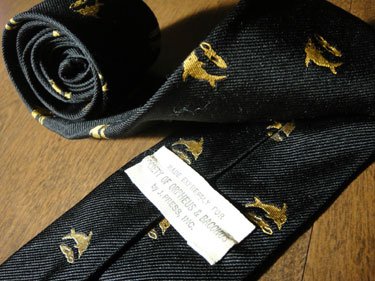
J. Press sells a Society of Orpheus and Bacchus necktie.
02 Sep 2015


John Caldwell Calhoun (1782-1850), Yale Class of 1804, 7th Vice President of the United States 1825-1832.
At the time, in the early 1930s, when Yale was creating the first ten residential colleges, John C. Calhoun was regarded as an inevitable choice for one of their names. Calhoun was only too obviously the single most illustrious statesman and political philosopher to have graduated from Yale.
Eighty-odd years ago, the political conflicts of the 19th century, the contest between Federalism and the Rights of the States, Secession and the American Civil War were viewed dispassionately as past history. Yale President James Rowland Angell was born in Vermont. Neither he not the members of the Yale Corporation of that time are likely to have agreed in the least with John Calhoun on Nullification, Secession, or the benevolence of Slavery, but they all properly regarded those matters as settled and the battles and controversies surrounding them as mere history, unconnected practically or emotionally to their own time.
Naming a Yale residential college for Calhoun simply accorded with a general American recognition of Calhoun as one of the most influential thinkers and most important statesmen in American history. As Richard Hofstader acknowledged, Calhoun was “probably the last American statesman to do any primary political thinking.”
Naming a residential college for John C. Calhoun obviously did not imply that the generally-New-England-bred authorities of that Connecticut University had suddenly converted into Confederate sympathisers. It merely signified their recognition of the accomplishments, personal stature, and historical importance of one of Yale’s most famous graduates. Doubtless, it was also intended, in a minor way, to recognize the national character of the modern university by honoring the champion of the (defeated) Southern section.
It appears, now, that the 21st Century Yale under a newer and more cosmopolitan leadership is about to reverse President Angell’s decision and to reject 80+ years of Yale history by removing the name of John C. Calhoun and renaming his residential college.
President Peter Salovey, last Saturday, welcomed the entering freshman class and announced an “open conversation” on renaming Calhoun College.
We all know what that means. Yale will accede to the loudest, shrillest, most emotionalist, and most radical voices. There will be a narrative about the injured feelings, the wounded sensitivities, of 21st Century African American students. Rational observations will be shouted down, and with complete pomposity and sanctimony President Salovey will express regret, but explain the vital necessity of bowing to contemporary political correctness. Calhoun will be out. His (previously vandalized) stained glass window pulled out and replaced. His name chiseled out of the Gothic sandstone. And you can bet that the college will be renamed, specifically in order to rub it in, for some personage of color, somebody like the world-famous Edward Bouchet, Yale Class of 1874, the first African American to graduate from Yale.
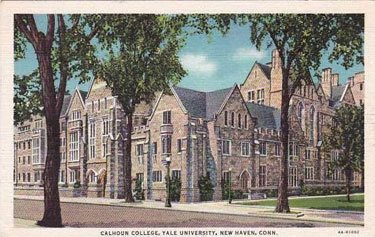
17 Aug 2015


Stephen Davis, now co-“head-of-College” for Pierson College at Yale. Davis has chosen to share the title with his frau. After all, a husband being Master (or “head”) of a college and not including wifie would be unequal. (Thousands of Yale men are spinning in their graves.)
Anybody doubt that Eliot and Vargas LLosa are right? Just read this, a piece demonstrating what kind of blithering, wimpy creeps have replaced the men who used to teach at Yale and serve as college masters. John Hersey, Master of Pierson in my day, must be laughing in Hell. And just look at that miserable wretch in the above photo: No jacket, no appropriate shirt, no necktie. He’s married, of course, to a priestess, and she appears for her photograph as co-“Head of Pierson” in a t-shirt!
The Yale Alumni Mag offers a now-go-out-an-throw-up-in-the-street item to brighten alumni’s lives today.
The sign on the door says “Pierson College Master’s House,†but the person who currently holds that title would rather you call him something else. Religious studies professor Stephen Davis ’98PhD, who was named master of Pierson in 2013, recently wrote to members of the college to ask that they “refrain from calling [him] ‘Master’ Davis.†He explained that “I have found the title of the office I hold deeply problematic given the racial and gendered weight it carries. . . . I think there should be no context in our society or in our university in which an African-American student, professor, or staff member—or any person, for that matter—should be asked to call anyone ‘master.’†He suggested that students could call him “Dr. Davis†or “Professor D.†Davis’s biography on the Pierson College website now refers to him as the “head of college.
If the old Lithuanian greenhorn Pans I knew growing up in Shenandoah had heard this one, they would not have called this wanker “master” (“Pan” in Polish and Lithuanian). They’d have snorted and called him: “chÅ‚op” (“peasant”, “serf”, “slave”).
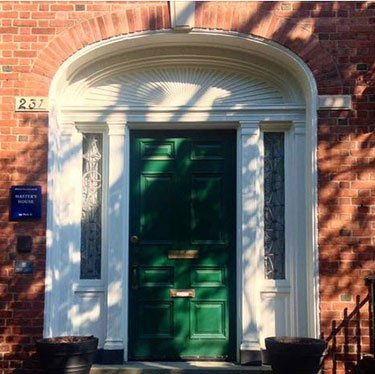
The doorway to the Master’s House in Pierson College.
12 Aug 2015

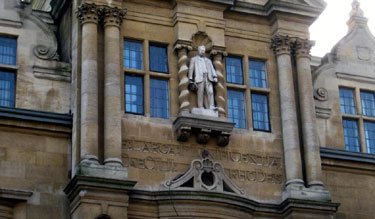
Statue of Cecil Rhodes at Oriel College, Oxford, where he was a student for one term in 1873. Rhodes left a portion of his estate to the college.
Last April, a statue of Imperialist hero Cecil Rhodes erected in 1934 was removed from the campus of the University of Cape Town. The statue had been previously desecrated with paint and excrement. When a crane lifted the statue away, celebrating students climbed up and danced on its plinth. Rhodes had to be removed, you see, because the 19th century figure was guilty of believing in African Inequality and was a renowned champion of British Colonialism.
Telegraph story
The insistence upon the removal of prominent historical figures guilty by the present standards of the extremist left of politically incorrect behavior and opinions is not merely restricted to Third World countries where revolutionary regimes have succeeded to power.
In Oxford, in the heart of England itself, the campus left is following the South African example and demanding the removal of a statue of Rhodes from a niche on the facade of his own college. Newsweek
The Left’s war on history, as you see below, at Yale, has been underway for decades.
What could possibly demonstrate the intellectual and moral fatuity of today’s academic establishment than this kind of abject surrender to the worst kinds of left-wing extremism in response to emotionalist blackmail?
If the study of History produces any kind of wisdom at all, the most basic component of that enlightened understanding would have to be the apprehension that it is impossible to pass judgement on the beliefs and actions of people living in the past by the standard of conventional opinions of the present.
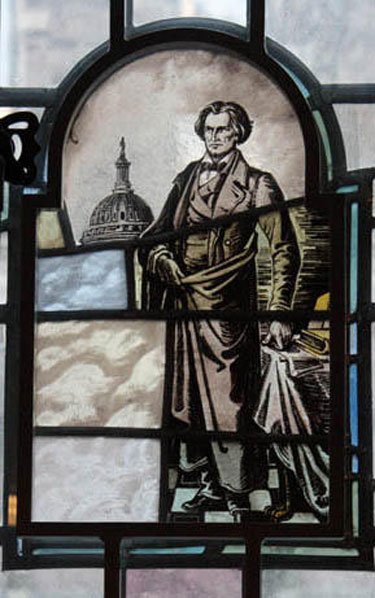
The stained glass picture of Vice President, Secretary of State, and political philosopher John C. Calhoun, Yale Class of 1804, ornamenting the Common Room of the Yale residential college named for the great man was deliberately broken by left-wing students during the 1970s. The window was restored, but portions of the window depicting a black slave in chains kneeling at Calhoun’s feet were removed officially in 1993, after a black student complained that he was personally offended.
22 Jul 2015

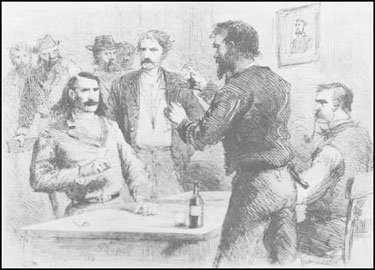
Amy Athey McDonald, at Yale News, describes Wild Bill’s first gunfight, and shows us a revolver once owned by Hickok, now in Yale’s Peabody Museum collection.
Davis Tutt shouldn’t have taken Wild Bill’s watch.
The former Confederate soldier and gambler was shot down by James Butler “Wild Bill†Hickok 150 years ago in Springfield, Missouri, in what is today recognized as the first quick-draw gunfight of the American West.
Events leading up to the legendary shootout began the night before with a dispute over a gambling debt. Hickok and Tutt had known each other for years, but there had been a falling out and Wild Bill refused to play cards with Tutt. According to an account by a witness who called himself “Captain Honesty,†Tutt retaliated that evening by giving money to every other man around the table playing against Hickok. A successful gambler, Wild Bill won nearly $200 that night, which angered his one-time associate even more.
Tutt called in a past debt of $45 on the spot from Hickok, who promptly paid up. Tutt then claimed another $35 debt owed from a previous game. Hickok disagreed with this second claim, saying he only owed Tutt $25. It was at this point that Tutt took Hickok’s gold Waltham watch from the table and said he would keep it until the debt was paid. Hickok warned Tutt against such a foolish action. Trial testimony from a J.W. Orr noted that Tutt later raised his price to $45.
While the details of what happened the next day on July 21, 1865, are not entirely clear, historians agree that Tutt showed up in the town square in front of the courthouse around 6 p.m. with Hickok’s watch. Wild Bill appeared at the other end of the square and warned Tutt not to come any further. The two began to cross the square toward one another, drawing their pistols. Exactly how far apart they were and what guns were used are not definitely known. It’s written that they were facing side-on, dueling fashion, almost 100 paces apart, with Hickok using his Colt Navy.
Tutt and Hickok fired one shot each. Tutt missed; Hickok didn’t. Tutt staggered and fell, shot through the heart, and Hickok was soon arrested and charged with murder. The charge was later reduced to manslaughter, but the jury found that Hickok acted in self-defense and he was acquitted.
The shootout launched Wild Bill’s fame as a gunman.
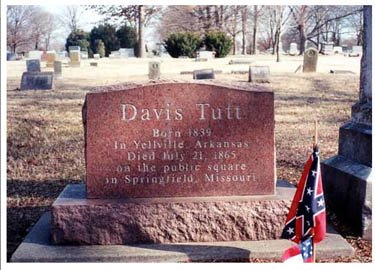
——————————————

French .44 Pinfire Revolver of unknown manufacture, presented by James Butler Hickok to Wild West Show manager William Green, Yale Peabody Museum.
Your are browsing
the Archives of Never Yet Melted in the 'Yale University' Category.
/div>

Feeds
|
























